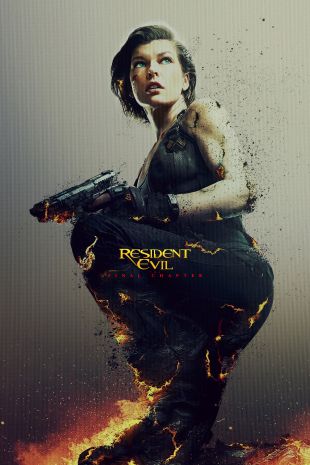
The first bars of the Wagner-by-death-metal theme to Resident Evil: The Final Chapter instill great confidence, as if declaring, "Step aside, this movie knows what it's doing." And it better, because this is the fourth time that director Paul W.S. Anderson has made an installment of this franchise with his wife/muse Milla Jovovich, the Dame Judi Dench of fanboy schlock (and that's not even including two additional entries that starred Jovovich, but were helmed by other directors). There's a brief recap about the particulars of this world, and how a virus cooked up by a scientist (Mark Simpson) to cure his daughter (Ever Anderson, Jovovich and Anderson's own offspring) of progeria went, well, viral, and turned practically every resident of Earth into a zombie (giving new meaning to "we are the 99 percent"). But then the catch-up spiels on and on and on (not unlike the similar Cliffs Notes at the beginning of Underworld: Blood Wars), until finally our heroine Alice (Jovovich) introduces herself and declares that this is the final chapter of her story. Well, let's hope so, because otherwise she'll have another paragraph of exposition to memorize next time.
Alice is searching for an "anti-virus" that, once unleashed, will destroy everyone infected with the zombifying T-virus. This is inconvenient because Alice herself is T-positive, so saving the world means certain death for her, too. But fretting about that can come later, because first she's got stuff to do, like evading big, slobbering monsters; outrunning zombie hordes thundering across the landscape like buffalo herds in the Old West; defeating squads of corporate goon police while dangling from one ankle after having been caught in a snare; and catching up with a band of still-human freedom fighters intent on stealing the glowing green vial of MacGuffin from baddie Dr. Isaacs (Iain Glen).

A movie that's wall-to-wall action sequences should have as its highest priority making them comprehensible, visceral, and thrilling, and Anderson doesn't do that here. The editing is strobed and frenetic, packed with muddy extreme close-ups and cutting away from every point of impact as if flinching from the blows. You can never map where combatants are in relation to each other or see exactly what they're fighting, as if the director is trying to hide something (and perhaps he is, because in one scene it's quite clear that a stunt double is taking a punch to the face instead of Jovovich). It adds up to a dull assault of things popping out of shadows, blowing up, and bursting into flames. It creates a lot of spectacle and noise without being exciting, like those windup chattering teeth, and there's more suspense in watching a stovetop Jiffy Pop inflate.
As if to make up for quality with quantity, technology exists in this world for "predictive combat software," which means several fights are visualized as two or three hypothetical duking-it-outs before the "real" one unfolds; it feels like the filmmakers are hedging their bets in the hope that audiences will like at least one of the possible outcomes. Did they choose this motif in order to make a video-game-inspired movie less movie and more game, to replicate the experience of "dying" at a task and getting a chance to do it again until you succeed? This misguided strategy of grafting one medium's rules onto another, like a taxidermist stretching a deer skin over a tiger form, does a disservice to both video games and movies. The choice to be more game-y smells gamey.
A video game may have a story, but that doesn't change the fact that a film isn't a series of action puzzles to be solved in an immersive environment. A movie -- a narrative -- is about the personal growth of a character as an experience changes him or her; or, in the case of action characters who don't grow over the course of a film, the bricks of the thrilling sequences need to be mortared together with a gradually richening understanding of who they are. In between the big rolling rock and the Ark of the Covenant, we learn who and what Indiana Jones loves (Marion), hates (Nazis), believes (artifacts belong to everyone), and fears (snakes). Try to describe Alice's personality without mentioning her name, what she looks like, or what she does for a living, and the only things left are some glowering, panting, and a vague hunger for revenge.
And while this movie may pass the Bechdel test with flying colors -- due to its large population of female freedom fighters -- there is nothing about Alice beyond her name and silhouette that is sincerely rooted in being female. She could be a woman, a man, a dog, or one of those dancing balloon men outside of car dealerships, and it wouldn't make the slightest difference in her character. (She's no Ripley, believe it or not.) Alice doesn't grow because of her experiences. She only levels up, and Anderson never shares the controls with the viewer. Watching Resident Evil: The Final Chapter isn't like playing a video game. It's like watching someone else play a video game, and if that's what you're after, maybe you should just do that instead.
